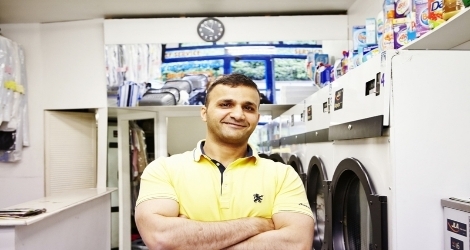Rudyard Kipling once said, “And it all goes into the laundry, but it never comes out in the wash.” Straight out of one of his many famous poems – Stellenbosch. Maybe old Rudyard had a bad experience in the industry back in good old England in the late 1800’s. Certainly though we try hard, we can’t seem to please every single customer that comes in. Some come in like a bull hollerin’ for its cow and some float in with the wind. Occasionally we get that customer who walks in with “a hand full of want and a mouthful of gimmie.” Most often they seem to understand our difficulties but a great number do not. Many times it seems they are just aggravated about something that happened in their life and the old laundry guy will get the bad mood slammed at him. Such is life in the big city they say.
“Overwhelmingly, It Is Not The Fault Of The Drycleaner Or Laundryman”
Consumer services such as the usual cities styles of consumer reports and agencies such as the Better Business Bureau can add to the confusion unless they have staff that can recognize drycleaning and laundry issues or have a designated expert review a problem. Anyone of us that have spent a day in court trying to make a judge understand why a garment failed, and not the drycleaner, who would know this? In the end, a wise judge familiar with a customer complaint will send the item in question to an independent laboratory to have it analyzed and then go with their recommendation on who might be at fault. It will be the fault of the garment failing to the service, the customer abusing the garment to some sort of stress or the drycleaner/laundryman using bad judgment on servicing it. Usually and statistically, it is overwhelmingly not the fault of the drycleaner or laundryman.
“Barbers Require A License, Why Not Drycleaners?”
Consumers (drycleaning and laundry customers) are not “hung out to dry,” no pun intended. They have many resources but again, are these resources as knowledgeable in the art of garment processing as we are, or such group’s as the DLI, to make a professional judgment? I think not. The usual percentages of fault lies within these numbers: Drycleaner or laundryman fault – 20% (this number is growing) the consumer and garment manufacturer – 80%. The reason our percentage of fault is growing in this industry is due to relaxed attitudes about education, association memberships and certification requirements such as what California once had in the early 1980’s.
After the California certification law was dropped, serious seekers of drycleaning and laundry education dwindled. Folks with no interest in learning the trade poured in and the industry took a dive to a certain extent. What a shame. Simple barbering still requires a license, why not drycleaners? It makes no sense to me.
Executive Directors Bill Hay And George Archibald
Once upon a time in California when the drycleaning and laundry association was state run by industry people we elected, cleaners and consumers relied on our word for what went wrong. We had nothing to hide. Many other states were run the same way. It was an honor and somewhat of an importance, that one belonged to an industry association or two. California’s association leader was longtime Executive Director George Laumann. The office was in Cupertino. It was an envy to belong to it. Increasingly, newer people that buy into the business, feel no need for an association. George once said that 60% of the calls to the association were from consumers and the rest from its members. Now we are lucky if 40% even belong to an association! Today, Arizona and California associations have former drycleaning people like my friends Bill Hay and George Archibald as Executive Directors. Some other states have drycleaners running their associations as well but many have professionals outside of our industry running them.
Naturally, there are always exceptions to learning a trade and the best experience is learning by doing. But I would hate to think that learning some bad habits voids any need for book training. I would also think that our customers might think of us more professionally if they knew we were educated in our profession. Books have a purpose and some of our work is technical. I was always proud of that fact. Knowing that we must have considerable knowledge of fabrics and chemicals is pretty important. Takes more of that than it does to barber. Hope I have not stepped on any barber’s toes here. I like barbers. They make me look better than I really am!
Well I’m headin’ to the wagon now, these boots are killin’ me!

